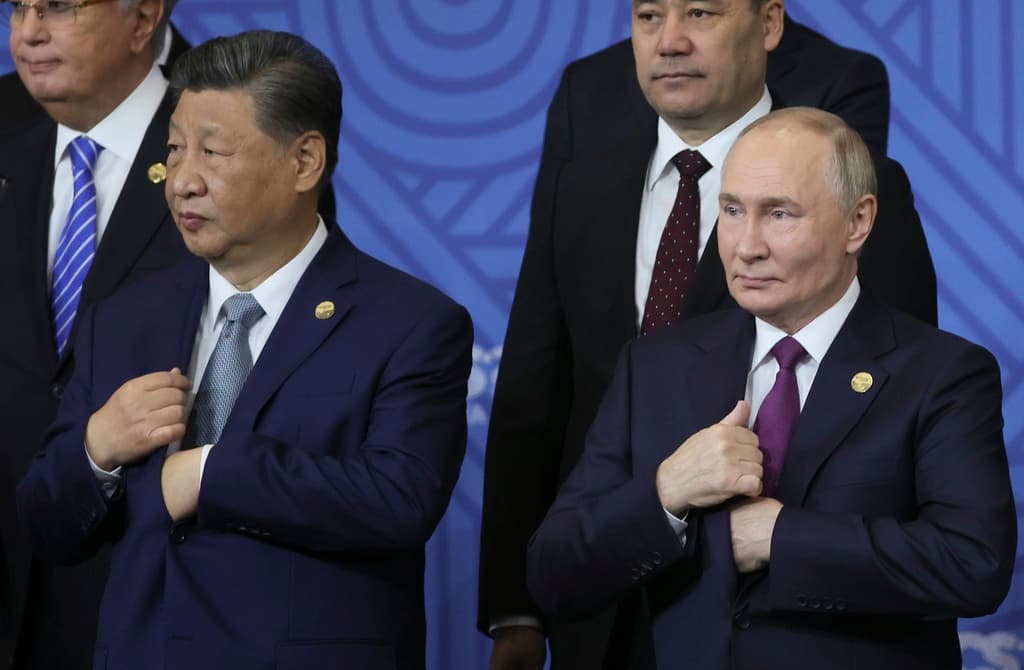Putin Seeks To Drive a Stake Into NATO by Forming an Anti-NATO Alliance
The group known as Brics — for its five original members, Brazil, Russia, India, China and South Africa — has just wound up a three-day confab by agreeing on exactly what the Russian leader wanted it to say, beginning with removal of ‘illegal sanctions.’

Russia’s president is forming a powerful counterweight to American-led alliances and relationships from Asia to Europe that may support the Russians in Ukraine.
The group known as Brics — for its five original members, Brazil, Russia, India, China and South Africa — has just wound up a three-day confab of leaders of 36 countries by agreeing on exactly what President Putin wanted it to say, beginning with removal of “illegal sanctions.”
Judging from Mr. Putin’s farewell to the gathering at Kazan, 552 miles east of Moscow, he could not have been happier with the results. Most of all, he had to love the final declaration inveighing against “the disruptive effect of unlawful unilateral coercive measures, including illegal sanctions” imposed by Washington and others ever since Russia tore Crimea from Ukraine a decade ago.
Mr. Putin, who has exercised dictatorial control over Russia for 25 years, praised the leaders gathered before him — many of them fellow dictators, including China’s president, for their “vision of new democratic global order.” All, he said, “share similar aspirations and values.”
With those sanctimonious words, on top of one-on-one sessions with President Xi, Prime Minister Modi of India, and others, Mr. Putin sought to drive a stake into the NATO alliance by forming an anti-NATO assortment of nations that are often at odds with Washington — or at least prefer to show their neutrality.
From the American viewpoint, perhaps the greatest disappointment was that one NATO member, Turkey, formally applied to join Brics — the latest sign of difficulties with Turkey’s president, Recep Tayyip Erdogan, who has defied Washington by buying Russian S-400 missile systems. Washington, which shares a critical air base in Turkey with the Turkish air force, may try to dissuade him, but it can do nothing to stop what could turn into a major hole in its defense network.
No, Brics, unlike NATO, is far from a military alliance, but it’s now expanded from its original five members to include Iran, Egypt, Ethiopia, and the United Arab Emirates — an assortment that suggests Brics’s opposition to Israel in the Middle East as well as support for the Russians in Ukraine.
The final declaration said nothing about either Ukraine or Israel, but Mr. Putin in his opening remarks evinced his delight over an enormous triumph of Russian diplomacy. As he put it, “The process of forming a multipolar world order is under way, a dynamic and irreversible process.”
A leading Indian newspaper, Hindustan Times, caught the mood of disappointment in the West with a headline asking, “NATO Nation Spooked Amid BRICS Summit In Russia?” The article was about the “alarm on the unstoppable rise” of Brics sounded by the leader of France’s rightist Patriot Party, but it reflected much broader concerns.
It’s “not a good idea to take BRICS lightly,” a report by the Washington-based Brookings Institution said. “The fact that such a meeting is happening at all signals a shift in global politics and exasperation with the U.S. role in the world,” as well as “growing resentment among middle powers toward the U.S.-led world order.”
Many of the participants pressed their own ideas for ending the war in Ukraine, no doubt also to Mr. Putin’s delight.
While talking up their hopes for a peaceful resolution of the war, none said a thing about getting the Russians to give up territory they’ve already overrun. Similarly, Mr. Xi called for “a comprehensive, just, and lasting settlement of the Palestinian issue,” a plea bereft of ideas about how to achieve that noble goal.
More substantively, Messrs. Xi and Modi met for the first time in five years, confirming an agreement for ending sporadic, bloody clashes along the border between their countries.
Mr. Xi, after an equally portentous meeting with Mr. Putin, said they had “deepened and expanded comprehensive strategic coordination and practical cooperation,” an indication that he might cooperate more closely with Russia on Ukraine and North Korea. China, reluctant to assist the Russians in Ukraine, is suspicious regarding deals with Kim Jong-un to acquire arms from North Korea, which China keeps on life support by providing oil and food.
Just as important, “We recognise the crucial role of BRICS in the process of improving the international monetary and financial system with a view to making it more responsive to the needs of all countries,” the final declaration says. Ultimately, the goal is to get out from under a system dominated by America and the West.

